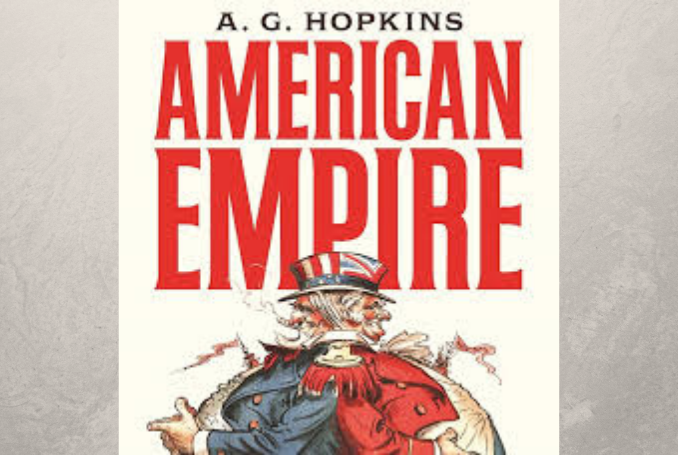
By Jim Miles
(American Empire: A Global History. A. G. Hopkins. Princeton University Press. Princeton & Oxford, 2018.)
Most recent works on the United States accept that it is an empire, perhaps not in the traditional landholding sense, but in the extent of its power and control of others. In “American Empire – Global History,” A. G. Hopkins accepts the idea of empire with several qualifications and with a precise focus on certain aspects of that empire.
His overall intention is to compare his outlook on empire with the features of other empires contemporary with the development of the US empire. His arguments are a good proof of his overall thesis that the development of the US empire while being a latecomer, had many features and parallels to the problems of other empires.
The critical time span he covers is from the Spanish War to the end of World War II. He does not ignore aspects beyond that, but the fullest development is concentrated on the U.S’ insular empire – the islands of the Spanish empire taken over after the 1898 war (Cuba, Puerto Rico, and the Philippines) and the Hawaiian Islands.
Native Americans Don’t Count
Hopkins accepts the warlike takeover of the US continental empire, and while not calling it an empire per se, does write, “Territorial expansion across North America was a form of settler colonialism involving conflict with indigenous societies and neighboring states, as well as discord among the settlers themselves.” This “assertive territorial expansion” was an “imperialism of intent” arriving at the conclusion “It is hard to argue that the United States created a continental empire in the nineteenth century.”
While using descriptions that fit the bill, he also does not use the words ethnic cleansing nor genocide for the destruction of the indigenous Americans. Racial supremacy is recognized after the Civil War and Indian Wars, but not acknowledged as being a foundational transfer of principle from the original religious settlers and the white supremacy as supported by the Papal Bulls of 1452.
His counter-arguments run from: scale (there was only a “tiny fraction” of the population as indigenous); to other states deliver the same kind of violence; and finally “imperialist expansion” does not equate with “the formation of the type of territorial expansion discussed in this study.” These are a rather disingenuous argument as it is rather easy to argue that the US created a continental empire. Essentially Hopkins self-defines empire for his own purposes while not successfully contradicting that there are various types of empire that are all true empires.
The ‘Real’ Empire
The above fault aside, Hopkins focus on the insular empire is detailed and instructive. One of the facets seldom explored in this empire is the extent to which the US, while gaining rhetorical and political independence, did not gain financial independence from Britain until after World War II. As a sidebar for today, the power of the City of London (its financial district) still holds enormous sway over financial markets through its crafting of the London Inter-bank Offered Rate (LIBOR – interest rates) and its control of two important commodities markets, silver and gold.
Empires, US or otherwise, are best described in three words: guns, debt, and racism (white supremacy).
Frequent references are made to guns. At inception, being the revolution, Hopkins writes, “The outcome of these concerns [land owners and finance] was the installation of elements of a military fiscal state imported from Britain.” These military endeavors “nurtured a belief in the efficacy of force that has survived to the present… Martial values became embedded in the concept of liberty in the United States to a degree that made the use of force… seem natural and therefore normal.” The use of firearms did not stand alone as it acquired colonies “by deploying the standard tools of the trade: firearms and finance.”
Finance
One aspect of the financial empire is indicated above, the US’ dependence on British financial systems and power. The other aspect is the transfer of these systems of financial power to their own empire. The insular colonies of the US earned money by exporting cash crops: sugar from all the islands; coffee as well from Puerto Rico; and pineapple from Hawaii.
However, the success of these early agro-industries was dependent on competition from the mainland States where sugar beets were becoming competitive and dependent on the political whims of the mainland in instituting tariffs and quotas to gain political support at home. A rich elite system in the colonies with many living in poverty created an environment that not surprisingly made for ongoing counter imperialist strategies, including outright rebellion and strikes for field and factory workers.
The financial system was essentially the same as today’s IMF ‘structural adjustment programs’ utilized throughout the third world – mostly Africa and Latin America – in order to place the target state into debt to the financial power of the US and its western allies. The Philippines became a financial burden that the US finally gave nominal independence to. Cuba had a full successful insurgent revolution but was then ignored by the US for its financial needs, leading it to work with the USSR. Puerto Rico eventually became a commonwealth – not a colony, not a state, sort of halfway between – and is still stuck in the cycles of poverty it started with as magnified by Hurricane Maria in 2020 and the later earthquake – all leading to Trump throwing out toilet paper in an ignorant display of the status quo.
Race
Much of the history of European/western empires finds its most common denominator in race relations, in white supremacy.
“Negative stereotypes of societies beyond the frontier reinforced a developing ideology of white supremacy that helped to shape national identities throughout the Anglo-world. Supremacy and certainty produced the “civilizing mission” which was a common feature of all these frontiers.”
Anglo-Saxonism “was the most commanding of the pan-national racial theories.” Regardless of the arguments used by its proponents – all of which are incorrect – the US fully adopted its attributes to the extent of “exceptionalism” and superiority over all other people and nations in the world. As others are deemed inferior, arguments then allow for violence within the “civilizing mission” in order to bring the “savages” at least up to a level where they might be able to be independent i.e. live and work by our “exceptional” rules.
In his summary, Hopkins writes, “Policy in all the Western empires drew on shared intellectual foundations of racial superiority. American rule was distinctive to the extent that it was particularly marked by the influence of segregation on colonial policy.” Comparisons – mostly similarities – are made with the other Anglo-Saxon elements of the empire – Canada, South Africa, and Australia – where indigenous populations were/are highly segregated from society.
Another Faultline
There is another element of Hopkin’s thesis which is arguable but fortunately does not detract from his overall presentation, more of a semantic argument that does not contradict the factual information.
In broadest terms, he outlines the development of the US empire as being at the start a “military-fiscal” arrangement, leading then to the status of a “nation-state” empire, and then finally into being an “aspiring hegemon.” The military-fiscal state disappears under the influences of the nation-state – the empire of the nation-state then becomes the aspiring hegemon, with the implication that it is not truly an empire ( and certainly not within the limited definitions provided as above).
It is hard to argue – well, sorry no it is not, that the US, since even before its official inception was a military-fiscal arrangement borrowed from their Anglo-Saxon roots. Since Eisenhower’s time, the phrase “military-industrial complex” has been widely used, with some more recent modifications and variations. It is easy to argue that “military-fiscal” describes the US (and other empires) much more broadly and accurately than military-industrial.
The word fiscal covers immense territory, from our consumer lifestyle, the debt creations of large corporations, the huge profits harvested by the FANG companies (Facebook, Apple, Amazon, Netflix, Google), the widespread debt instruments placed on the citizen from education to mortgages and on into health care, the large corporations harvesting wealth from al citizens as they produce the materials to support the militarized state (G.E., Raytheon, Boeing et al). It fits beautifully within previous empires and certainly within today’s US empire.
Modern Empire – the Military-fiscal State
This history of empire more or less ends with the transformations of the insular empire into the units described above. An attempt is made to outline events post World War II, and succeeds within a very narrow scope. The United States today still remains very much a military-fiscal state even though the author turns to fiction (Captain America and The Avengers) to posit his concluding question: “Will Captain America persist with military force to advance freedom and democracy or will he adopt a form of smart diplomacy…?”
From Hopkins’ own arguments in “American Empire – A Global History” and current events within the US and its current attitudes globally, the answer is easy: he will persist with military force to advance freedom and democracy, a statement that is self-contradictory as freedom and democracy do not come from the barrel of a gun as indicated by the US’ many failed wars around the globe.
One of the problems sometimes when writing history is knowing when to quit. By trying to be fully up to date, Hopkins misses too many points about empire: China and Russia acting in tandem are not noted; the huge debt-based society, now surviving on enormous quantities of money printing by the Federal Reserve in order to sustain the military and maybe the collapsing society in general; the large problems of environmental pollution and climate change; and finally the always immediate threat of nuclear war.
Not quite so final. When examining empire, race, debt, and white supremacy, Israel, as a large component of the current US empire (consisting of many sycophantic allies and over 800 military bases in over 135 countries) is not mentioned. This is possibly the author’s attempt to avoid the now racially-biased charges of anti-semitism which might sink the book before publication, but it could also be another ingrained denial of the state of the US empire and its military-fiscal association with Israel and all the tensions created in the Middle East. You will not find it in the index nor anywhere else passim in the text.
Sum
“American Empire – A Global History” is an enormous academic undertaking, and conforms to all the requirements of academia. It has numerous citations/references for anyone wanting to search out the sources of information. It is written in classic academic style: intro chapter with a preview of the main thesis and chapter contents, each chapter with its own introduction and summary sandwiching the overall arguments, and a conclusion/summary outlining again the main thesis.
In that regard, it is an exceptional read, and a lazy reader could understand the whole book by reading the first and last chapter, and the first and last section of each chapter.
However, it is not a book that will be a bestseller on its own merits as it is complex, detailed, and requires the reader to have a bit more than a basic understanding of the flow of modern history in order to follow the arguments. It is a history, but it is not strictly linear, and it bounces back and forth with its different concepts from different places and different times. Without some global background knowledge, the work remains too esoteric for general consumption.
– Jim Miles is a Canadian educator and a regular contributor/columnist of opinion pieces and book reviews to Palestine Chronicles. His interest in this topic stems originally from an environmental perspective, which encompasses the militarization and economic subjugation of the global community and its commodification by corporate governance and by the American government.

– Jim Miles is a Canadian educator and a regular contributor/columnist of opinion pieces and book reviews to Palestine Chronicles. His interest in this topic stems originally from an environmental perspective, which encompasses the militarization and economic subjugation of the global community and its commodification by corporate governance and by the American government.








Salam,P.C.,
Do you already know when “AMERICAN EMPIRE”, by A.G Hopkins, will be findable in France ?